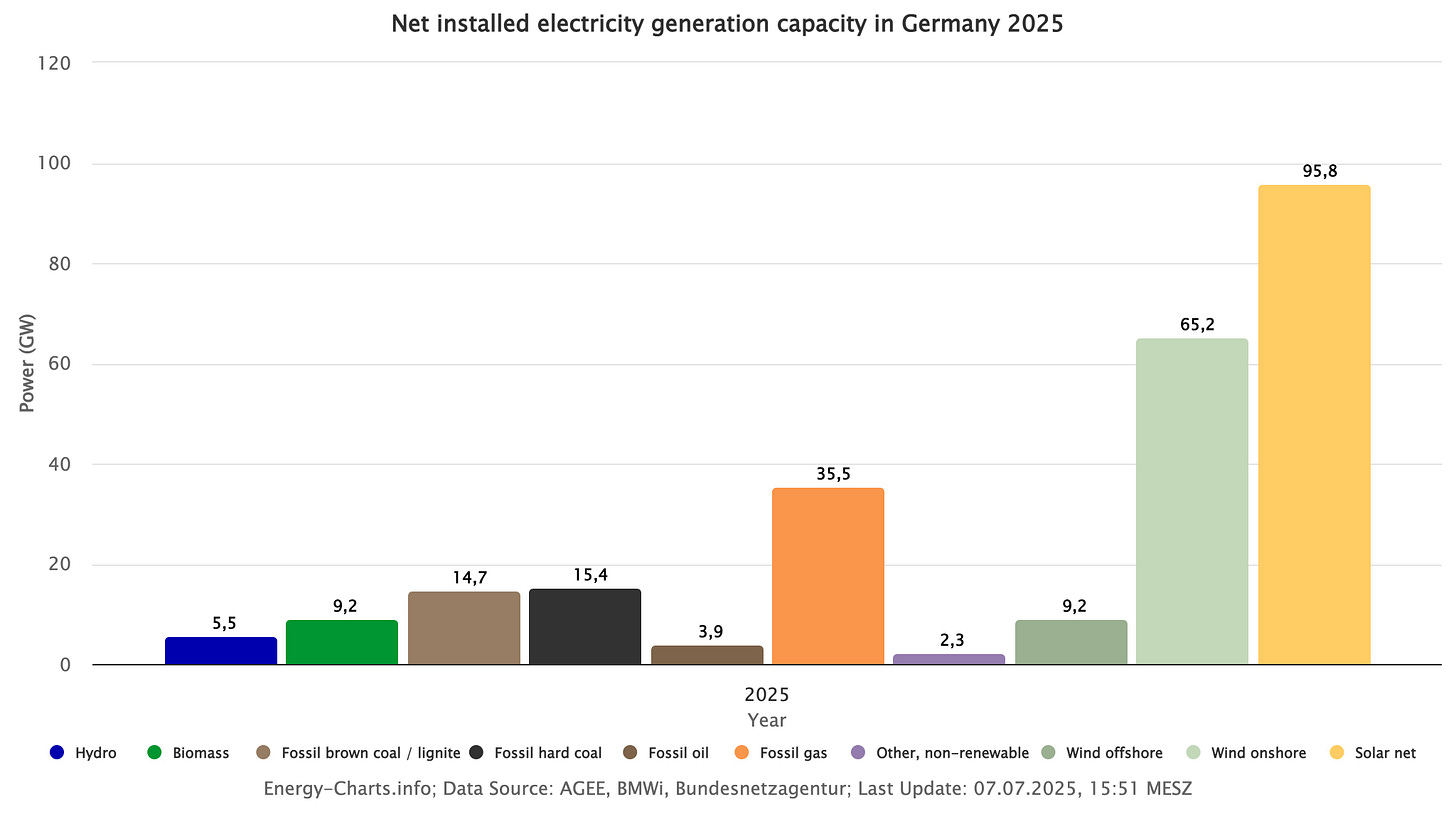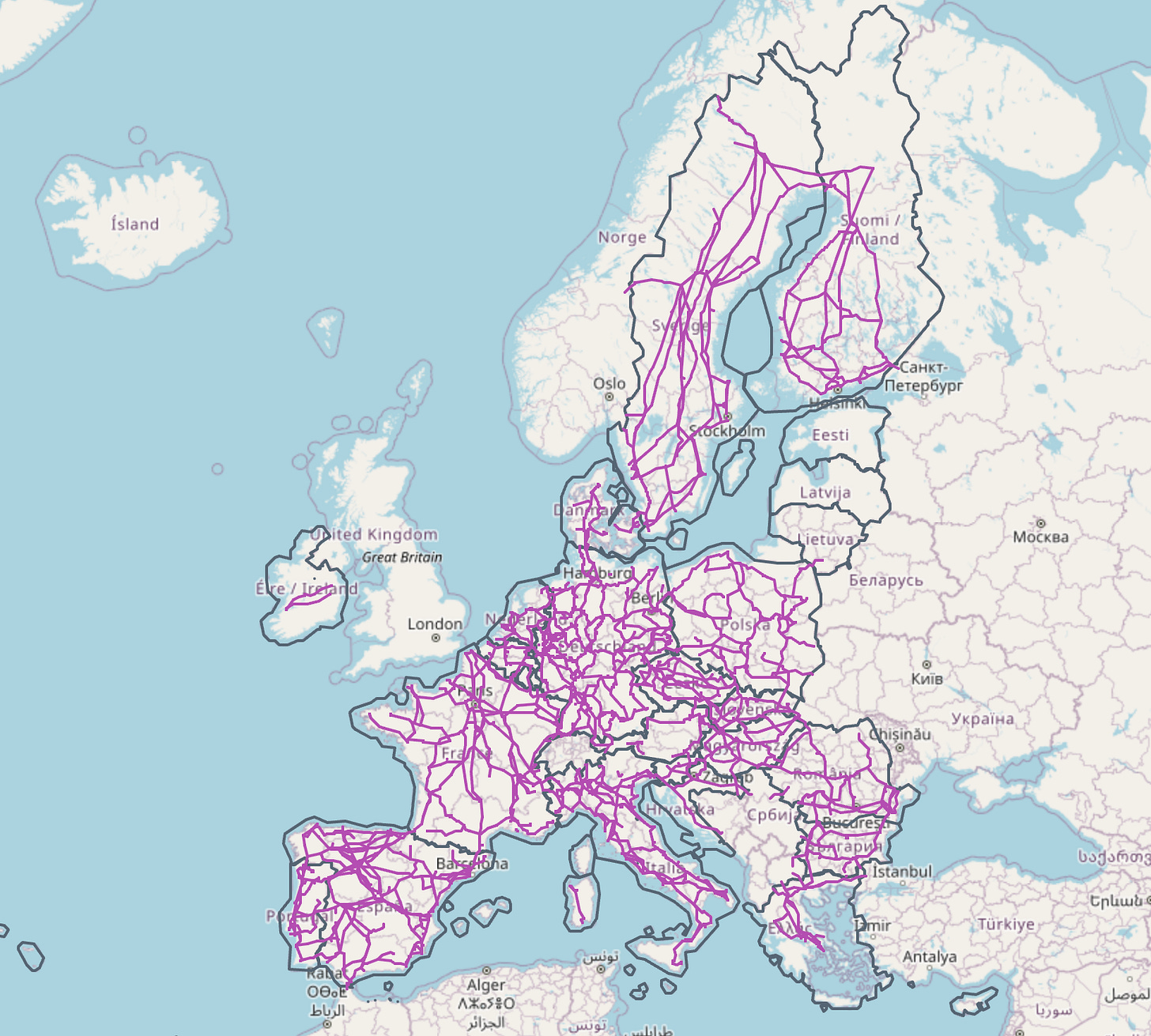You don’t put an arsonist in charge of fire safety. And you probably shouldn’t hand Europe’s energy decisions to the woman who helped turn Spain into blackout country. Meet Teresa Ribera. She used to be Spain’s Minister for the Ecological Transition. Today she is the EU Commissioner in charge of competition policy. In that role, she plays a powerful part in shaping Germany’s energy choices.
Germany has committed to sourcing 80% of its electricity from renewables by 2030. But obviously, wind and solar don’t work on demand, which means the country will need roughly 21 GW of new gas-fired backup plants. These facilities are designed not to run most of the time, but to step in only when the weather fails. Making their business case is hard.
When Net-Zero Means More Coal
These plants would operate so rarely, their revenues wouldn’t come close to covering their fixed costs. No sane investor would finance them without some form of guaranteed support. In other words: subsidies.
And that’s where Ribera comes in. As the European Commissioner overseeing competition policy, she effectively gets to say whether Germany can subsidize these gas plants or not. Given her past as a fierce advocate for a 100% renewable grid in Spain, you can probably guess where this is going.
Under her helm, the Commission is pulling the plug on fossil fuel infrastructure subsidies. In the past, the Commission signaled it might tolerate up to 5 GW of new gas plants in Germany to help secure supply. But anything beyond that? Only if the plants are designed to eventually run on hydrogen — an option so expensive and speculative it borders on science fiction.
As a result, German coal plants will have to run longer than planned. Right now, they cover around 30 GW, about a quarter of Germany's electricity demand. Their capacity is set to shrink to 17 GW by 2030 and operators would love to shut them down rather today than tomorrow. After all, thanks to the EU's emissions trading scheme, their margins are already thin. However, they can’t. Germany’s Federal Network Agency (BNetzA) prohibits it. It has classified over 20 coal-fired power plants as critical for system stability. Without these coal plants and no new gas plants coming online, the power supply would break down.
This creates the absurd situation that high-emission coal has to run longer because support for lower-emission gas plants is being denied. It’s the kind of logic you’d expect from a socialist economy where outcomes don’t matter, only ideological purity.
It sounds insane. But in a strange twist, Ribera’s intransigence might be the most productive thing Europe’s done in years. As counterintuitive as it may seem, Ribera might force a return to reason in Germany’s energy policy. Let’s break down why.
👀 Reading this from a forwarded email? Subscribe to The Brawl Street Journal to get it straight from the source…
Germany’s Grid, Everyone’s Problem
Germany’s energy transition is not exactly loved by its neighbors. The strain from Germany’s renewables-heavy grid doesn’t stop at the border. During Dunkelflaute, the dreaded “dark doldrums” when wind and solar fall flat, power prices spike across Central and Northern Europe, leaving other countries to pay the price.
In mid-December 2024, for example, a winter wind lull sent intraday electricity prices soaring to nearly €1,000/MWh as Germany had to import power from wherever it could. These price spikes don’t just hit households. They force energy-intensive industries to halt production, wrecking efficiency and hammering competitiveness. Sweden was livid. As the country’s Minister for Energy Ebba Busch put it, “I’m furious with the Germans,” blaming Germany’s nuclear shutdown and weather-reliant grid for “very serious consequences” in Sweden. Norway’s energy minister called it “an absolutely shit situation” and even floated cutting power interconnectors to the EU.
Poland and the Czech Republic have also long borne the brunt of Germany’s energy chaos. For years, surges of excess German wind power—so-called “loop flows”—spilled eastward through their grids en route to Austria, threatening their own stability. In 2016, Poland’s grid operator warned that these unplanned flows posed a threat of an uncontrolled outage, comparable to the infamous 2006 blackout, when a single line outage in Germany triggered a chain reaction that plunged over 15 million Europeans into darkness.
These loop flows didn’t just strain Poland’s grid, they made it harder to import electricity from other neighbors when it was actually needed. So Poland took matters into its own hands. It spent hundreds of millions on phase shifters, devices that reroute power, on its border with Germany. This “electronic wall” now shields Poland from the worst of Germany’s renewable overflow.
In short, Germany doubling down on renewables is dangerous. Its grid is deeply tied into the EU’s and continued wind and solar expansion without proper backup increases volatility for everyone. Germany’s green push also means rising dependence on China. Solar panels and batteries are almost entirely made there. Western wind turbine makers are already losing ground.
As Denmark's Minister for Energy put it: "We all know that of course we can't have an electricity system based on solar and wind alone. There has to be something else to support it." But that “something else” is being blocked by Ribera.
The Price of Green Waste
Again, her role as Commissioner for Competition puts her in a position to do so. Because subsidies, called “state aid” in EU-speak, are generally forbidden under EU law. The original idea was to prevent market distortions and unfair competition between member states.
However, over the decades, the EU has carved out a lot of exceptions. In fact, this area of law has metastasized. What started as a tool to protect competition is now a political instrument, used to push through the agenda of the day. And of course, the Commission has already let Germany pour huge amounts of money into wind and solar.
Without massive subsidies, Germany’s energy transition wouldn’t function at all. And the market distortions these subsidies cause aren’t subtle. Germany clocked over 457 hours of negative electricity prices in 2024 alone—moments when power producers had to pay someone to take their electricity. In a functioning market, anything you have to pay someone to take off your hands is called waste. Fueling that process with billions of euros isn’t exactly a sign of a healthy system.
But now, as unintentional as it may be, Ribera has broken the cycle of madness.
The logic is simple: without additional backup capacity, new renewable capacity can’t be added to the grid. The BNetzA has been warning for months that expensive emergency measures to keep the grid running are becoming increasingly likely because of renewables. To keep adding them without sufficient backup is to play with fire.
The longer the fight between Germany and the Commission drags on, the worse the outlook becomes for further wind and solar build-out. Time isn’t on the side of renewables. Getting natural gas backup online will take between 4 and 6 years and that doesn’t even include the procurement process.
As things stand today, Germany will have to slow down the renewable rollout or even revisit nuclear as a more viable long-term alternative. After decades of green dogma, that may sound unthinkable. But in politics, one axiom usually holds: staying in power ranks above everything else, even net-zero ideology. And blackouts will threaten careers. Course correction is in the entire bloc’s interest. The EU’s growing debt burden makes Germany its economic backstop. Letting the country crash its industrial base with soaring energy costs helps no one. Teresa Ribera may not want to save Germany from itself. But she just might.
Share this with anyone who’s already written Germany off!
📨 People in boardrooms, energy desks, and hedge funds keep forwarding this. Stop getting it late — subscribe now!
Already subscribed? Thanks for helping make BSJ quietly viral.






![Figure: Picture of a phase shifting transformer from Amprion [1]. Figure: Picture of a phase shifting transformer from Amprion [1].](https://substackcdn.com/image/fetch/$s_!dkVD!,w_1456,c_limit,f_auto,q_auto:good,fl_progressive:steep/https%3A%2F%2Fsubstack-post-media.s3.amazonaws.com%2Fpublic%2Fimages%2Fa36b6f67-d277-4366-a12b-59dabaa92d9e_1024x1024.jpeg)


Fantastic article, Brawl. When I was in Belgium last year visiting my sister-in-law (don’t worry, my wife was also with me), I floated a question (because I like to make people uncomfortable) to her and her boyfriend. I asked “which EU county will be the next to leave the Union?” They looked at my like I had three eyeballs.
I presumed that the next shoe to drop would be a result of immigration, but the more I read your articles, I am starting to think it will be a result of poor energy policy.
Thank you for your continued effort with these high-impact articles.
while I hope you are correct and Germany basically forces their way, overruling Ribera, my observation, and I discussed this in the wake of the Spanish blackout , is that we will need to see 3 major events that can be directly attributed to the idiocy before enough people in Germany rise up and force a change. so that may be blackouts, or maybe it means that industrial facilities close and people lose their jobs because power is no longer affordable, (consider if BMW or Mercedes had to close more plants because they couldn't afford the energy to make cars there). You are correct that the only thing that matters to people in power is staying in power, but it is very difficult to threaten an EU commissioner's job given it is not an elected position. so elected politicians will have to rise up against the commission, something that will be extremely difficult